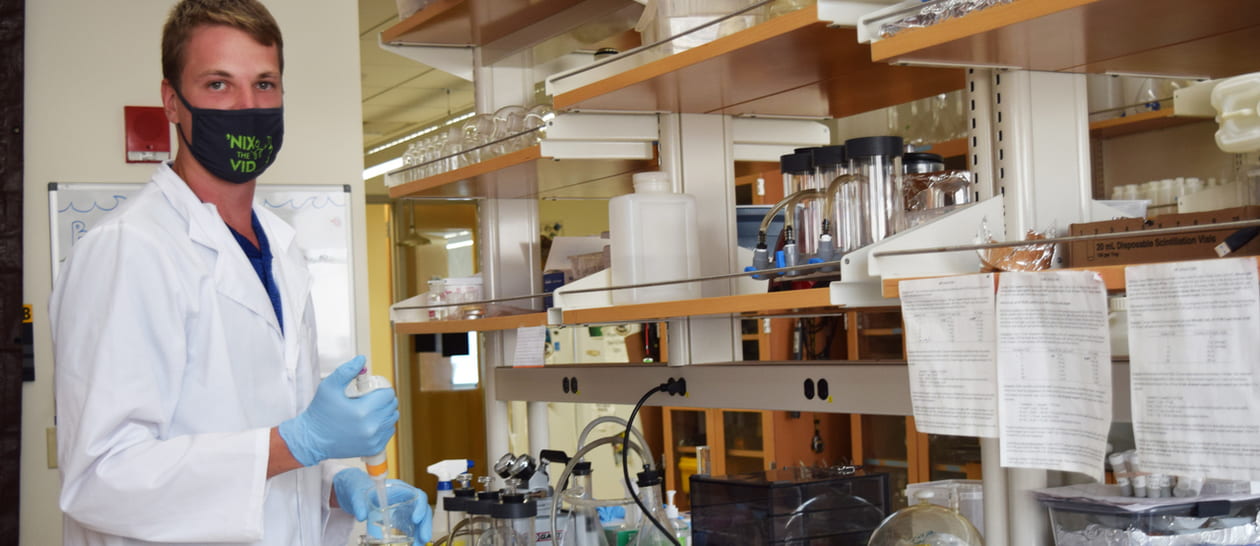(Reprinted with permission from the Freshwater Collaborative of Wisconsin)—Tyler Kunze never anticipated a career as a water scientist. Yet in May, he became the first student to earn a bachelor’s degree in water science from UW-Green Bay. He’s now a graduate student in UW-Milwaukee’s School of Freshwater Sciences (SFS).
“It’s been a long and winding road getting here,” says Kunze, who grew up on a dairy farm an hour’s drive from the nearest body of water. “I never would have thought graduating high school that I would be in this position today.”
Kunze’s path exemplifies how opportunities to conduct undergraduate research and to build a professional network can lead to more water scientists — the primary goal of the Freshwater Collaborative of Wisconsin.
On the family farm, Kunze developed a strong appreciation for the natural environment. He also really liked math and chemistry. A bachelor’s degree in environmental sciences sounded like a perfect way to combine his interests. He chose UW-Green Bay’s program based on its reputation and ideal setting for studying the outdoors.
While at UW-Green Bay, he particularly enjoyed his classes in hydrodynamics. Toward the end of his sophomore year, Kunze took a course with Christopher Houghton, an assistant scientist and graduate of UWM’s School of Freshwater Science, who suggested graduate school. The idea began to take hold after Kunze interned with New Water in Green Bay, where he met people who managed the watershed.
“The gears were turning in my head that grad school was a possibility,” he says. “When I started my undergrad research, it jumpstarted my passion for conducting research and discovering new things about different processes in the science field.”
That research involved working with his adviser Dr. John Luczaj to determine whether Lake Michigan water was leaking into the aquifers in Door County. Kunze spent the summer before his senior year knocking on people’s doors to collect water samples from their wells. Although, they didn’t find water from Lake Michigan, they used the samples to create the first isoscape — a geologic map of isotope distribution — for northeast Wisconsin groundwater. Kunze analyzed the data and presented it at the 2021 American Water Resources Association Conference.
“It gave me a head start on what I’d be doing at the School of Freshwater Sciences. Professor Luczaj really prepared me for it,” Kunze says.
Luczaj also encouraged Kunze to add the water science degree when UW-Green Bay launched the program in 2019. Kunze was on track to graduate early and decided earning the double degree would prepare him for graduate school.
In September, he began his master’s in freshwater sciences at UWM, and he was able to begin working with his advisor and UWM professor Harvey Bootsma in June. Kunze spent the summer studying invasive mussels at Sleeping Bear Dunes National Lakeshore with Bootsma; Ben Turschak, an SFS alumnus who is now a fisheries research biologist with the Michigan Department of Natural Resources; and scientists from the National Parks Services.
“What I’m most looking forward to at the SFS is meeting these amazing scientists and learning from them,” Kunze says. “It also will be really fun to do my own research, to figure out a problem and to try to find a solution that can help people.”
Kunze isn’t sure where his future in water will take him: water chemistry, water quality, invasive species mitigation, maybe a PhD? For now, he’s leaving his options open.
“If you would have asked me even two years ago if I was going to get my master’s degree, I probably would have had some doubts,” he says. “I don’t want to put myself in a box. I want to see the different opportunities and see where I fit.”
One thing is certain: Wisconsin has itself another freshwater scientist.


